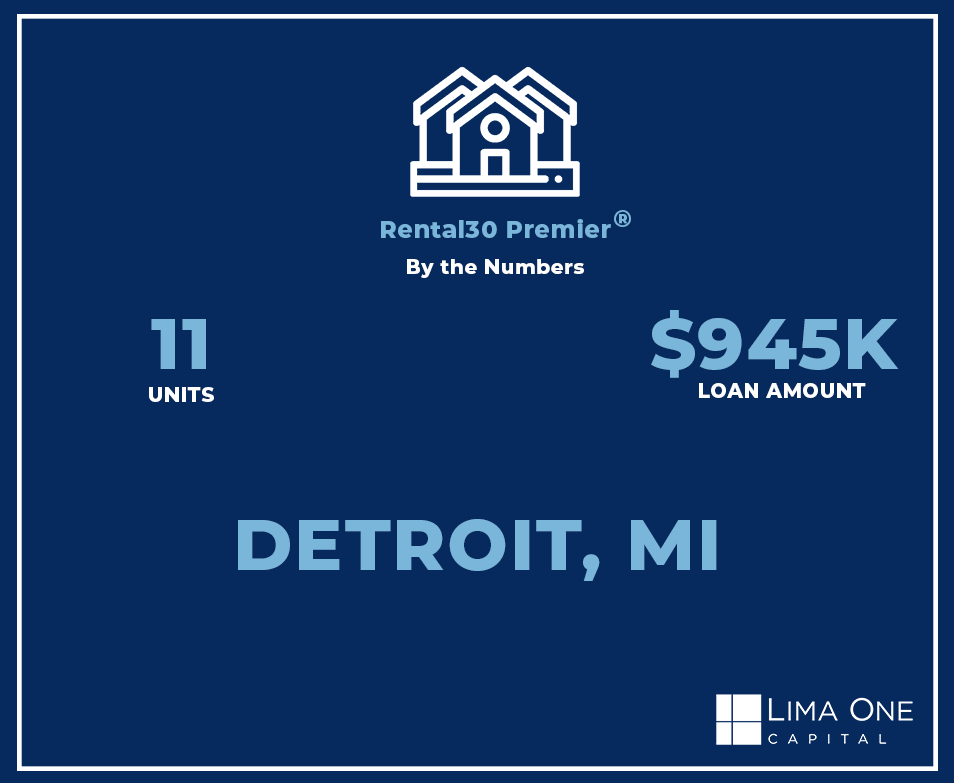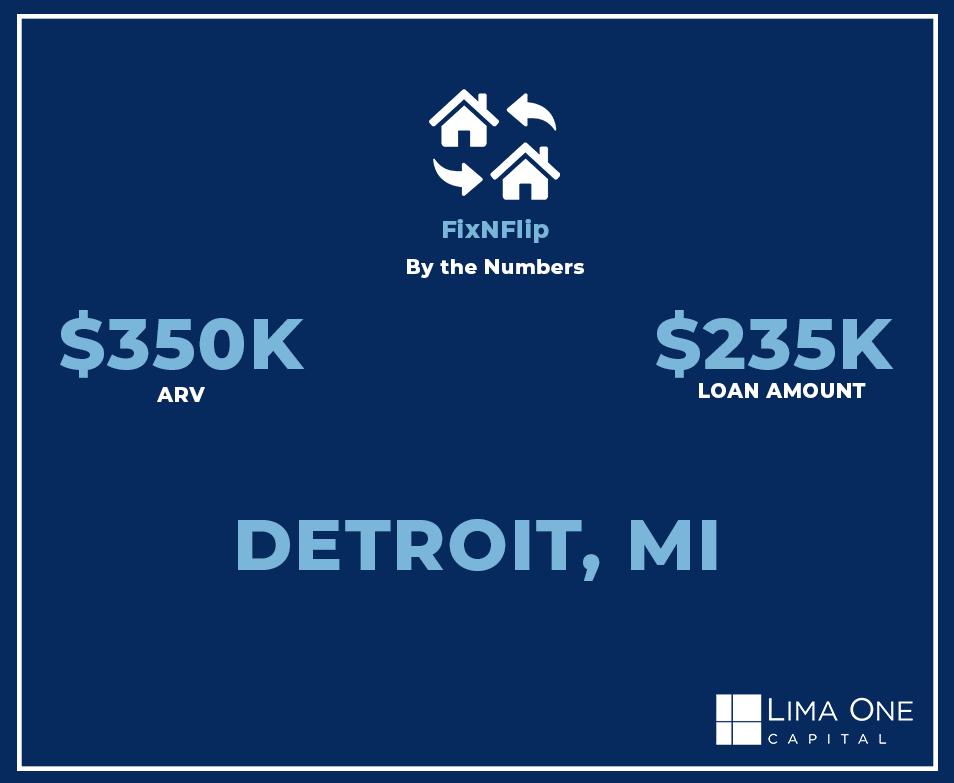SFR Rental Investment Properties Yield Big Returns in Detroit
Within the city limits, Detroit has seen a loss in population and affordable housing inventory, while the suburban areas have turned into a buyer’s market despite home prices being more than triple the price as in the city.
There have been slight improvements to Detroit’s city housing issues in recent years, but many areas within the metro still have more supply than demand. However, extremely low home prices within the city limits have attracted more buyers in the past year – which has driven the very low median home price up.
Median home prices in metro Detroit increased from $226,000 in 2020 to $253,000 in 2021 – an 11% increase YOY. Comparatively, the median home sale price of houses within the city limits is $70,000 – a 27% increase from 2020.
Despite the contradictions between its metropolitan and suburban housing markets, Detroit’s rental market remains strong.
The demand for single-family rentals is skyrocketing, and with the median price of SFR properties falling at a more reasonable pace than in many other markets across the nation, real estate investors are looking at an amazing opportunity to purchase rental property with solid yields and cash flow.
Detroit real estate investing has attracted many new investors, especially those who know where to look and prioritize quality property management.
With high-end retailers like Whole Foods moving in, and high-tech stalwarts like Microsoft, Google, and Pinterest opening offices in the area, Detroit’s future is looking bright. Not only is Detroit’s growing real estate market good news for the housing industry, it’s also good news for investors who are interested in purchasing Detroit investment properties.
Booming Economic Growth
Known famously as the “Motor City,” Detroit is best recognized for being the birthplace of the modern assembly line, the Ford Model T, and Motown Records. While the automobile industry found its home in Detroit in the early 20th century, today the city is home to a diverse economic hub.
General Motors, Ford, and Chrysler currently have major corporate, manufacturing, engineering, design, and research facilities in Detroit, but other Fortune 500 companies like Ally Financial, DTE Energy, and Detroit Manufacturing Systems have also left their mark on the city’s economy.
Post Pandemic Recovery
The pandemic hit Detroit, Michigan hard. It impacted workers and sectors unevenly. For example, the automotive and manufacturing sectors were resilient and showed little evidence of an economic slowdown. However, like many other markets in the U.S., small businesses and the leisure and hospitality industry took a beating.
In February, the Detroit Regional Chamber released its annual report examining the state of the region’s economy and how it weathered the pandemic. The report highlighted some promising statistics.
- New business applications in Michigan increased 42% in 2020 – an indicator of growth after a recession.
- The median sale price for single-family homes in the metro Detroit market increased 23% from Q1 to Q3 in 2020.
- New construction permits in 2020 matched 2019 levels.
Another strong indicator of Detroit’s post-pandemic recovery is its unemployment rate. Before COVID-19 shut down the economy, Detroit’s unemployment rate was 4%. At the height of the pandemic in May 2020, the city’s unemployment rate reached a staggering 25%, which was almost double the national average of 13%. At the end of July, the U.S. Bureau of Labor Statistics reported that Detroit’s unemployment rate had fallen back to 4.5%.
Just how well has Detroit recovered from the COVID-19 pandemic? Not only is Motor City’s recovery projected to lead the state of Michigan’s recovery, but it’s also projected to be stronger than Michigan’s recovery as a whole.
Development Plans Mean Promise for Investors
An economic outlook report released by the University of Michigan and City of Detroit predicts a stronger recovery in Detroit than statewide. Detroit’s projected recovery is supported by several large development projects.
In 2019, Stellantis Fiat Chrysler Automobiles announced its plans to combine the Mack I Engine Plant and the idled Mack II Engine Plant to create a new state-of-the-art 3 million-square-foot, $1.6 billion assembly plant. When the plant opened in 2021, it became Detroit’s first new assembly plant in 30 years. Through the Detroit at Work initiative, approximately 3,000 Detroiters have already been hired by Stellantis for its Mack Avenue plant and other nearby Stellantis facilities.
“Mayor Duggan has a clear strategy, which is to attract major employers that will put Detroiters to work, and this study reflects some of our initial success in those efforts,” according to Nicole Sherard-Freeman, Group Executive of Jobs, Economy and Detroit at Work. “As the study suggests, we expect our numbers to get even stronger as Amazon and other projects come online and begin hiring more Detroiters.”
The Gordie Howe International Bridge project is another major development project that brought nearly 4,000 jobs to the Detroit area. The bridge is expected to open by 2024 and will add a second bridge span across the Detroit River to connect Windsor, Ontario, Canada to Detroit.
Detroit is also getting five new Amazon sites currently under construction at the former Michigan State Fairgrounds. One of the sites will be an 823,000 square-foot fulfillment center that is expected to create 1,200 new jobs. The distribution center is expected to open in 2022.
“We’re thrilled that Amazon selected Detroit for what will be one of the largest fulfillment centers in Michigan,” Detroit Mayor Mike Duggan said. “Amazon has been a great partner and its most important delivery will be the 3,000 construction jobs, 1,200 permanent jobs and new small business opportunities this new facility will bring to our city.”
The State of Detroit’s Rental Market
While it’s clear that Detroit’s economy is rebounding, other metrics are also showing that Michigan’s Motor City is well on its way to recovery.
Home prices are on the rise, and it’s no surprise that rental prices are, too. Over the past three years, rents in Detroit have grown from an average of $972 in 2018 to $1,146 in 2021 – an increase of 18% across all rental classes. This is great news for real estate investors and the Detroit real estate market.
For investors looking to buy SFR real estate properties or build a rental portfolio, Detroit is the place. Currently, Detroit ranks 6th of 53 large metros in percentage of single-family renters, with 41% of the city’s renters residing in single-family rental homes. Overall, the percentage of renter households in the Detroit area is 53%; the national average is 38%.
RE/MAX surveyed those 53 large metros in May and found that the overall average number of home sales was down 0.2% from April’s total, but it was up 53% compared to May of 2020. Detroit led the YOY sales percentage increase at 137%.
These stats are great news for investors who are looking for strategic investment opportunities. Detroit’s low home prices, increasing rents, and booming economy provide investors with incredible real estate investment opportunities.
What Does Detroit’s Rental Market Mean for Investors?
Detroit, MI has become a real estate investor’s dream because of the low home prices and availability. Investors who are thinking of following a buy-and-hold strategy should consider Detroit an option because of the city’s rental occupancy and increasing rent prices.
Detroit’s median home price is feeling the effects of the ongoing inventory shortage, but with strong demand for SFR rentals and the median price of a single-family home falling below $100,000, investors have a lot of wiggle room on their bottom line.
While inventory might be harder to find, investors with strong real estate investment strategies can still profit. It’s now more important than ever to have a lender in Detroit capable of helping you:
- Secure a loan with the best price and maximum leverage for your next rental investment
- Close properties quickly and certainly
- Run your construction and rehab projects smoothly
If you’re interested in rental portfolio loans or Detroit real estate investing, contact us to learn more. When it comes to financing rental properties and real estate investment portfolios in Michigan, we’re the experts you’re looking for.
Our team of experienced professionals will help guide you through our rental loan programs regardless of your experience level and help you purchase, refinance, or cash out individual rental properties, as well as entire portfolios.
Get started today and scale your rental property portfolio with Lima One, the nation’s premier lender for real estate investors.
Detroit’s Rental Market Stats
- The average monthly rent of current leases across all rent classes has increased from $1,040 in 2020 to $1,146 in 2021 – a 4% growth YOY.
- Renter occupancy has remained high during the eviction moratorium, increasing from 96% to 97% YOY.
- New construction permits have increased 64% YOY.
- Single-family home construction permits have increased 36% YOY, while multifamily construction permits have increased 164%.

Recently Funded Deals


Recent Comments